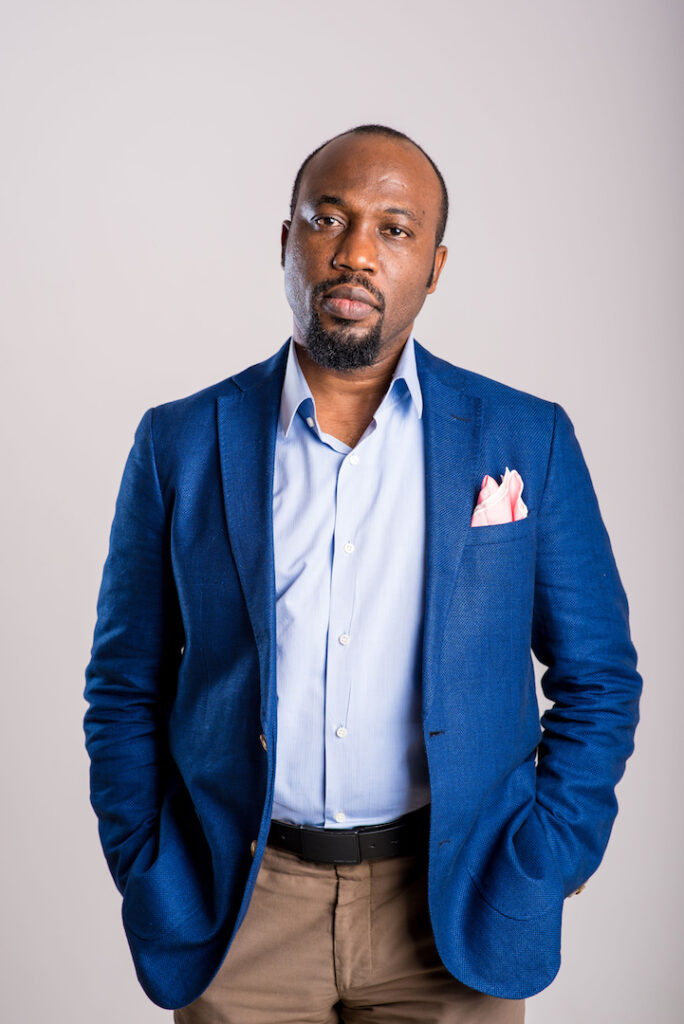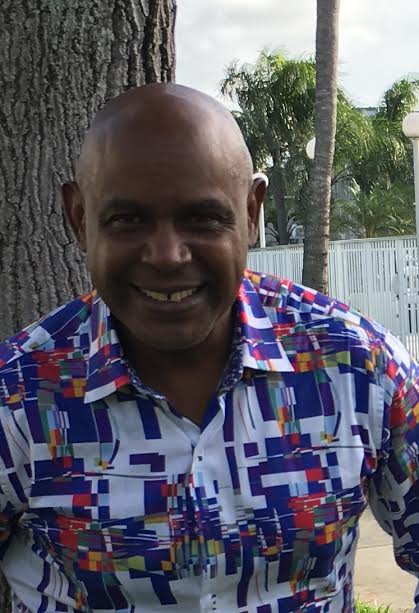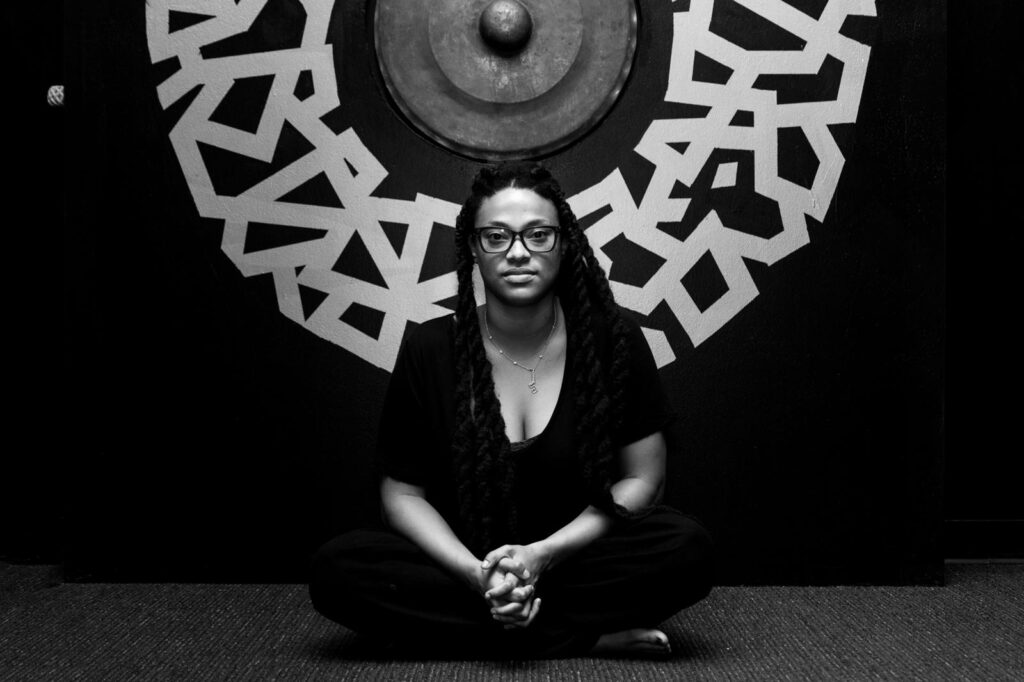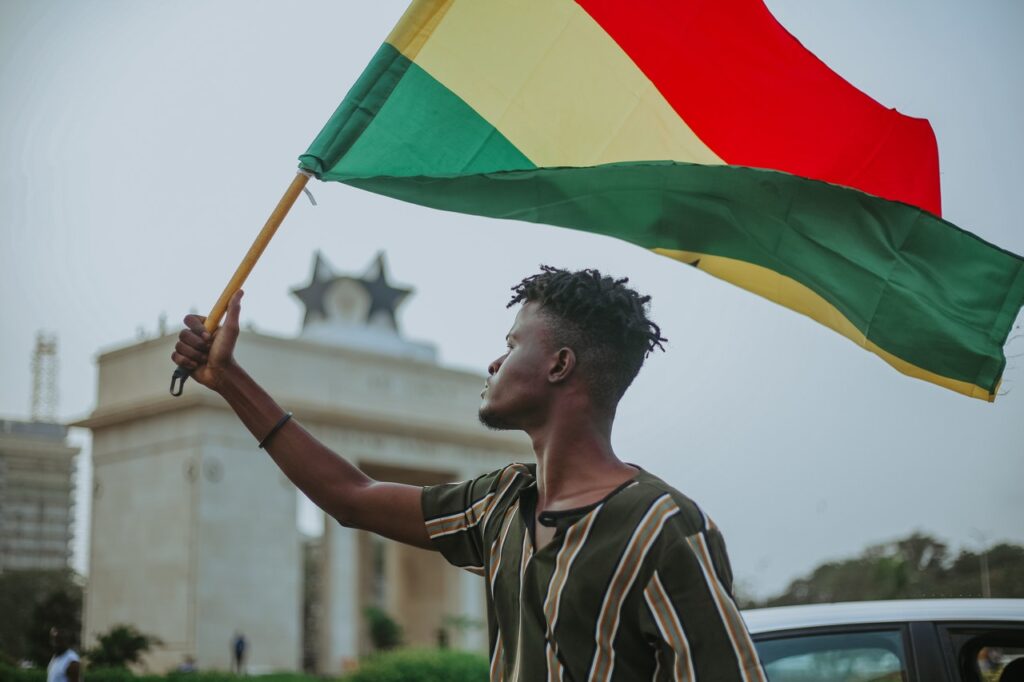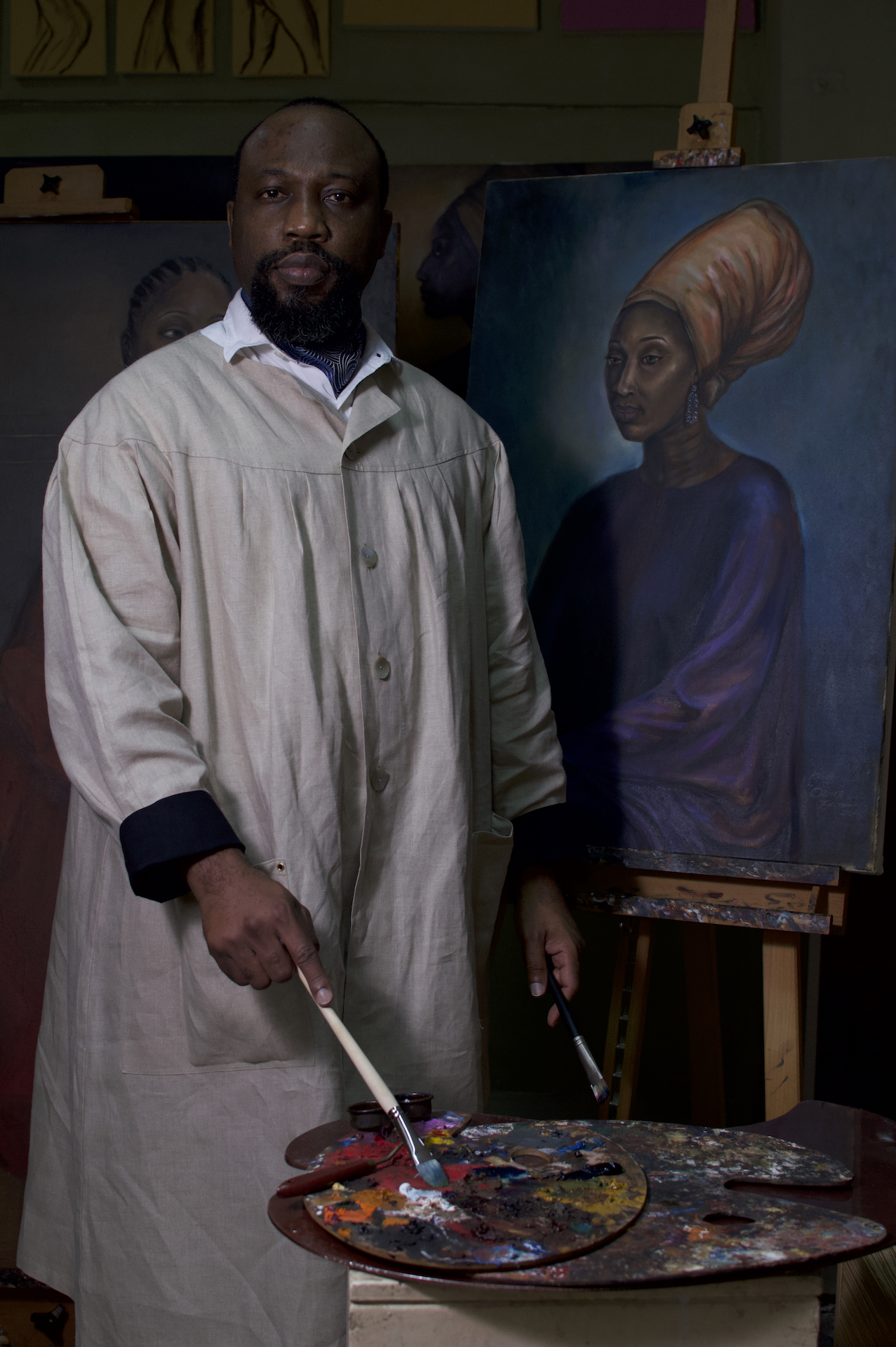
Celebrating award-winning artist and art advocate, Oliver Enwonwu
SMO Contemporary Art presents Politics of Representation, an exhibition of paintings celebrating award-winning artist and art advocate Oliver Enwonwu at the Alliance Française Gallery from 20 September to 10 October, 2021.
Through Enwonwu’s strong figurative style, Politics of Representation interrogates the complex layers of history connecting the African continent with the West. His powerful portraiture celebrates the cultural, political, and socio-economic achievements of Africans and how these have affected the identity of the global black race. The exhibition contains works from Enwonwu’s ‘Black Victoria’, ‘Signares’, ‘Belle of Senegal’, and ‘Wanderers’ series, which explore the effects of migration, eventually “dissolving boundaries and our notions of time and space.”
“His works are odes to beauty, excellence and regality, reminding one of visual poetry in the style of a classical Shakespearean sonnet,” commented Sandra Mbanefo Obiago, the exhibition curator and Founder and Artistic Director of SMO Contemporary Art. “His brush strokes express stoic grace, poise and formality, at a time when figurative art in celebration of the Black body have formed a critical backbone of the global movements around Black identity, such as the recent Black Lives Matter generational cry of affirmation and power.”
“In adapting sixteenth century old Masters’ modes of representation and techniques, I explore how for example, the mixed heritage French-African women of the Island of Gorée in Senegal negotiated their identities during the 18th and 19th centuries “, explained Enwonwu, an artist and historian who is better known as an art advocate and the President of the Society of Nigerian Artists, the professional body for all practicing visual artists in Nigeria. “I celebrate the African woman in form and rhythm through jewelry, adornment, and apparel, drawing on historic narratives of black female defiance against cultural and political imperialism.”

IMAGE: Ebony, (from the Black and Proud series), 2020, oil on canvas, 62.5 x 62.5cm
Some of the works in the exhibition are a homage to his late father’s masquerade series, highlighting the spirituality and rhythmic movement of the dance of the masquerade, a performance which transcends time and space to rest on a sensory level of liberation.
“In Oliver Enwonwu’s solo exhibition, one encounters a unique archive of portrait paintings inspired by queries of absence of African personages in the artistic milieus of 16th – 19th century Western art history,” stated Samuel Egwu Okoro, Art History Professor in the Department of Fine Art and Design at University of Port Harcourt.
“Oliver finds ways to imbue his imaginary sitters with a sense of identity, allowing their distinctive features, clothing and compelling posture to give the otherwise unknown character a clear sensibility. Oliver’s vivid portraits, depicted in stylish, colourful attire, imbue his subjects with a strong sense of regality, autonomy and self-assertiveness,” commented Hannah O’Leary, Director/Head of Modern & Contemporary African Art, Sotheby’s.
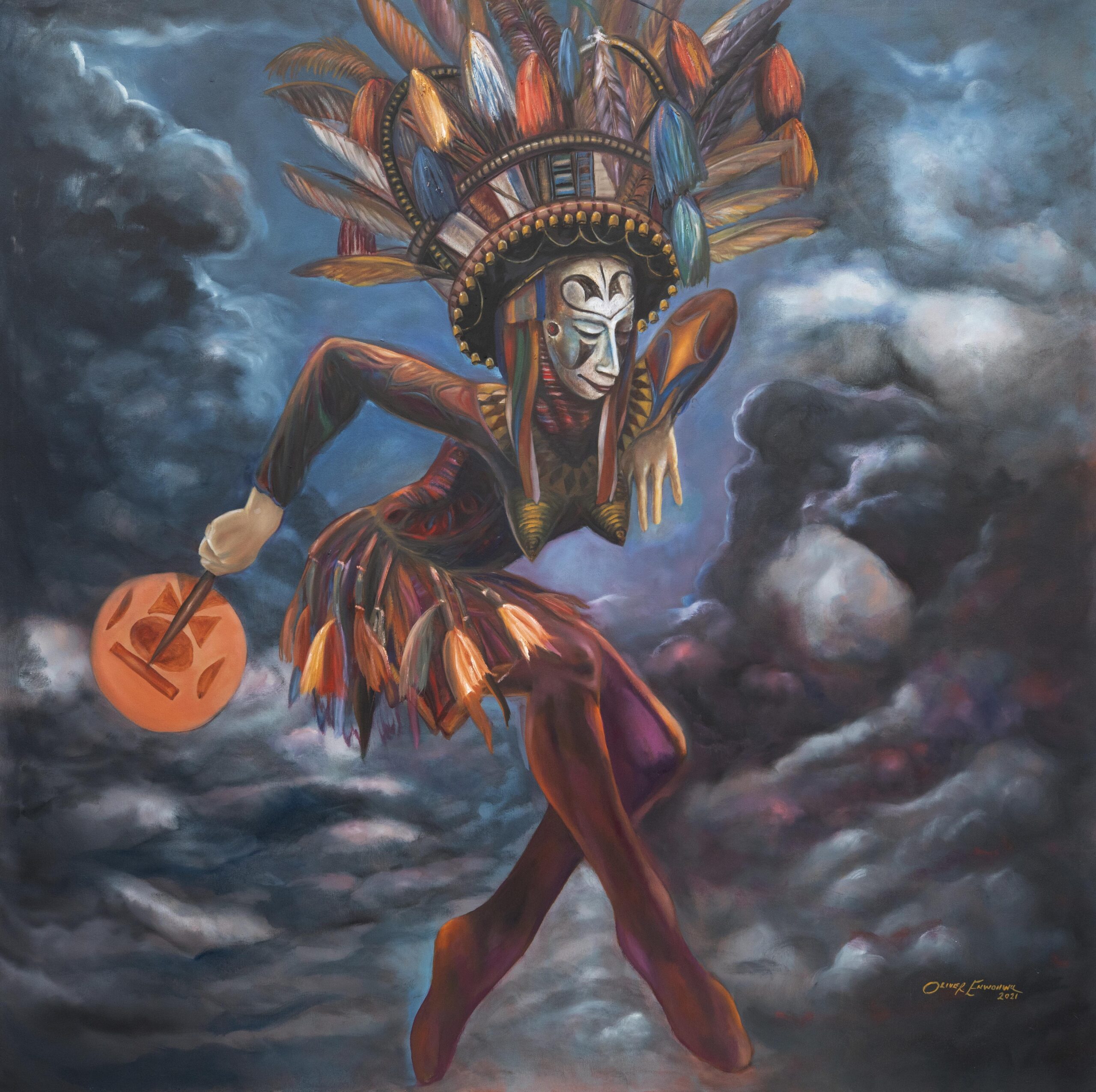
IMAGE: Spirit in Flight, 2021, oil on canvas, 147.2 x 145cm
Enwonwu holds a Master’s degree in visual arts with distinction from the University of Lagos, Nigeria and is currently working towards his PHD in African Art History at University of Benin. He comes from a long line of remarkable artists, such as his grandfather, a reputable traditional sculptor, and his father Ben Enwonwu, widely known and celebrated as Africa’s most celebrated pioneer modernist. He has participated in over fifteen exhibitions, spoken about the global art market at global conferences, and has been featured in international media including the BBC, Arise TV, The Daily Times and Vanguard.
Artist’s Statement
Strongly figurative, my art interrogates the complex layers of history between the African continent and the West, with portraiture playing a huge part in my oeuvre. Here, I address the near absence of Black personages in accounts of Western art history by adapting 16th century Old Masters’ modes of representation and techniques of painting as well as classical poses that imbue an air of power, regality and pride in the sitter.
Comprising mainly of the ‘Body of Power’, ‘Signares’, ‘Belle of Senegal’, and ‘Wanderers’ series, my portraits are of subjects not always known personally to me and are often idealistic; completely invented or recalled from memory. However, a connecting thread runs through the series evidenced by the fact that the figures all appear confident and their gaze remarkedly self-contained and unabashed.
Closely related are the ‘Signares’ and the ‘Belle of Senegal’, which deal with the effects of European Imperialism in Francophone West Africa. Significantly, the former explores how the Mulatto French-African women of the Island of Gorée and the city of Saint Louis in French Senegal negotiated their identity in the 18th and 19th centuries. The celebration of the Signares lends weight to arguments that historically, women have also occupied a pride of place in African society. The latter category engages present-day women of Senegal, chronicling their increasing hybridity that absorbs and transforms global fashion trends yet retains the best aspects of their culture. In a celebration of the African woman, both series are united in the handling of form and rhythm beneath the large volume of apparel, jewelry and adornment.
In ‘Body of Power’, the body at once becomes a contested site and a weapon of resistance to challenge the status quo. All through history, the body as a theme has always been explored. However, not all bodies are equally valued in every culture; some are regarded highly while others are despised and even censored. In Western accounts of art history, black bodies—complete with kinky hair—are almost excluded, except when they are depicted in servitude. Cultural battles prevail today with controversies revolving around such issues as socially preferred size, shape, age, sexual expression and gaze as well as colour of bodies. The dark almost black bodies of the sitters in the ‘Body of Power’ series have a common goal to not only resist such narratives but also to act in socio-political protest—the Aba Women’s Riot of 1929 readily comes to mind.
The network of lines strewn across the almost corrugated faces of the Tuaregs in ‘The Wanderers’, are evidence of their far-flung travels that dissolve boundaries and conflate notions of time and space. The lines are also a metaphor for their migratory experience along trodden paths, and more importantly, the history of trade relations between Africa and Europe.
In tribute to my father, an incursion into the metaphysical is marked by my series based on contemporary interpretations of traditional African dance and the Onitsha-Igbo masquerade pantheon, Mmonwu. Two dominant strains characterise the masquerades; the graceful female Agbogho-mmuo and the more aggressive male Ogolo. My chief interest lies not in the decorative qualities of their costume but in the rhythmic movement and spirituality of their dance, as well as in their role in bridging the spirit and physical worlds. This thrust is clearly apparent in my engagement with African dance. Here, I draw semblances between the lithe and sinuous bodies stretched to near abstraction in accentuating the rhythm of their often trance-like movements, and the maternal and nurturing qualities inherent in womanhood.
In all, the paintings presented in Politics of Representation weave a new narrative by addressing our shifting identities and how we have individually and collectively retained the best parts of our culture and heritage while responding to such significant events as Western education, colonisation, industrialisation and globalisation.
Oliver Enwonwu, CMC, FIMC
September 2021
Politics of Representation is supported by Alliance Francaise and Louis Guntrum wines, and is open to the public from 19 September to 10 October 2021.
For more information, please contact: info@smocontemporaryart.com
Watch the video format of the Press Release HERE.
Kindly visit the websites of SMO Contemporary Art, Oliver Enwonwu and Omenka Gallery to know more about Contemporary African Art and Oliver Enwonwu’s works.
Press Release and Content by: SMO Contemporary Art and Oliver Enwonwu
All images used with the full permission of Oliver Enwonwu
Share this:
RELATED STORIES


